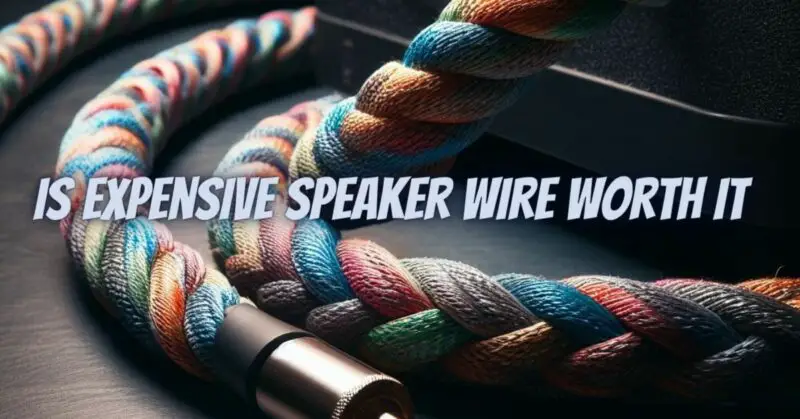When it comes to setting up a high-quality audio system, one of the debates that often arises is whether expensive speaker wire is worth the investment. Audiophiles and audio enthusiasts frequently discuss the benefits of premium speaker cables compared to more affordable options. In this article, we’ll explore the various factors involved in this debate to help you make an informed decision about whether expensive speaker wire is worth it for your audio setup.
Understanding Speaker Wire Basics
Before diving into the question of whether expensive speaker wire is worthwhile, it’s essential to understand the basics of how speaker wire works. Speaker wire is responsible for carrying the electrical signals from your audio source (e.g., amplifier or receiver) to your speakers. It consists of two conductors, typically made of copper or aluminum, surrounded by an insulating jacket. The thickness of these conductors, measured in gauge (AWG), is a crucial factor in determining the wire’s resistance and conductivity.
- The Role of Resistance
The primary function of speaker wire is to transmit electrical signals with as little resistance as possible. Resistance in speaker wire can lead to energy loss and affect the quality of the audio signal. However, the distance the signal must travel and the impedance of your speakers are the key factors that influence the importance of resistance.
For short wire runs (typically under 20 feet or 6 meters) and speakers with a relatively low impedance (e.g., 4-8 ohms), the resistance of even basic, inexpensive speaker wire is generally negligible. In such cases, expensive speaker wire may not provide a noticeable improvement in audio quality.
- Speaker Wire Thickness (Gauge)
The gauge of speaker wire is a crucial factor to consider. Thicker wires have lower resistance and are more efficient at transmitting electrical signals. However, this does not mean that you always need the thickest wire available. As mentioned earlier, for short distances and regular home audio setups, a reasonable gauge like 16 or 14 AWG is usually sufficient.
Expensive Speaker Wire: Myth vs. Reality
Now that we have a fundamental understanding of speaker wire, let’s address some common myths and realities surrounding expensive speaker wire:
- Myth: Expensive Speaker Wire Always Provides Better Sound Quality
Reality: While premium speaker wire may offer some improvements in sound quality under specific conditions, these improvements are often subtle and may not be discernible in most home audio setups. The human ear has limitations, and the differences between expensive and standard speaker wire may not be easily perceptible.
- Myth: Audiophiles Swear by Expensive Speaker Wire
Reality: Audiophiles and audio enthusiasts have a deep passion for their hobby, and they often seek the best possible audio quality. As a result, they may invest in expensive speaker wire and other high-end audio components. However, their preferences may not align with those of the average listener, and their equipment and listening environments are often optimized to detect subtle differences in audio quality that may go unnoticed by most people.
- Myth: Expensive Speaker Wire Guarantees Durability
Reality: The cost of speaker wire does not necessarily correlate with its durability. Durability primarily depends on factors like the quality of the wire’s insulation, the thickness of the conductors, and how well it’s handled and maintained. Inexpensive speaker wire with proper care can last a long time, while expensive wire can wear out if not cared for correctly.
Considerations for Choosing Speaker Wire
When deciding on speaker wire for your audio setup, consider the following factors:
- Budget: Determine how much you’re willing to spend on speaker wire, keeping in mind that there are diminishing returns as you move up the price scale.
- Distance: Consider the distance the wire needs to span. Longer distances may benefit from slightly thicker wire to minimize resistance.
- Speaker Impedance: Check the impedance rating of your speakers. Lower impedance speakers may benefit from thicker wire to reduce resistance.
- Listening Environment: Assess the quality of your listening environment. In a well-treated room with high-end audio equipment, you may be more likely to notice subtle differences in sound quality.
In the debate over whether expensive speaker wire is worth it, the answer largely depends on your specific audio setup, budget, and personal preferences. For most home audio systems with average wire lengths and speaker impedance, moderately priced speaker wire will provide excellent results. However, if you’re an audiophile seeking the absolute best sound quality and have the budget to support it, experimenting with premium speaker wire may be worth exploring. Ultimately, the choice of speaker wire is just one piece of the audio puzzle, and factors like speaker placement, room acoustics, and the quality of your audio source are equally important in achieving exceptional sound.


